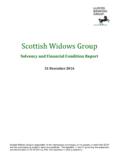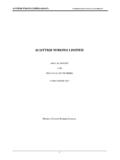Transcription of PRA Insurance Returns - FS Assist
1 Ernst & Young LLPPRA Insurance ReturnsA Practical GuideFebruary 2014EY iFeedbackFeedback on the booklet would be welcomed. Any comments by readers or enquiries shouldbe referred to Kim Harmer or James Smith of EY, preferably by e-mail to or by telephone +44 (0)20 7951 0556 and +44 (0)20 7951 of the FCA or PRA Handbooks in this booklet, while believed to be correct,cannot be taken as sufficiently full, accurate or precise to apply to any particular situation;reference to the Handbooks themselves (or to related primary or secondary legislation)should be made in appropriate cases. Ernst & Young LLP accepts no responsibility for lossarising from any action taken or not taken by anyone using this booklet was the brainchild of John Philpott, who produced numerous annual editions ofthe guide to Insurance prudential regulatory Returns for submission to the FSA and itspredecessor regulators, over many years prior to his retirement from EY in 2012. Thoseresponsible for the production of the present publication gratefully acknowledge all of thegroundwork done by John, without which this booklet would not have been aryEY iGlossaryIn general, words and phrases are defined when they first appear in the text; for the most partthe practice of the PRA and FCA Handbooks is followed, but a number of additional termshave been introduced in the interests of clarity.
2 Any reference to a particular Chapter, rule,Form or Appendix should be taken, unless the context dictates otherwise, to indicate aChapter of, rule set out in, Form prescribed by or Appendix to the Interim PrudentialSourcebook for Insurers. References to chapter or appendix with a lower-case first letterare internal references to this following abbreviations have been used in the text:ABI=Association of British InsurersCEIOPS=Committee of European Insurance and Occupational PensionsSupervisors (now EIOPA)COBS=Conduct of Business SourcebookCP=Consultation paperCRR=Capital resources requirementDAC=Deferred acquisition costsDTI=Department of Trade & Industry1E=Evidential provisionECR=Enhanced capital requirementEEA=European Economic AreaEIOPA=European Insurance and Occupational Pensions AuthorityFCA= financial Conduct AuthorityFICOD= financial Conglomerates DirectiveFICOD1= financial Conglomerates Amending Directive (2011)FOS= financial Ombudsman ServiceFOS Ltd= financial Ombudsman Service LimitedFPC= financial Policy CommitteeFRS= financial Reporting StandardFSA= financial Services AuthorityFSCS= financial Services Compensation SchemeFSMA= financial Services and Markets Act 2000G=GuidanceGAAP=Generally accepted accounting practice1 Now the Department for Business Innovation & Skills (BIS).
3 Gloss aryEY iiGCRR=Group capital resources requirementGEN=General provisionsGENPRU=General Prudential SourcebookGICR=General Insurance capital requirementIAIS=International Association of Insurance SupervisorsIAS=International Accounting StandardIBNR=Incurred but not reportedICA=Individual capital assessmentICG=Individual capital guidanceICOBS= Insurance Conduct of Business SourcebookIFRS=International financial Reporting StandardIG=Individual guidanceIGD= Insurance Groups DirectiveIMAP=Internal Model Approval ProcessINSPRU=Prudential Sourcebook for InsurersIPRU(FSOC) =Interim Prudential Sourcebook for Friendly SocietiesIPRU(INS)=Interim Prudential Sourcebook for InsurersISA=International Standard on AuditingISPV= Insurance special purpose vehicleLTICR=Long-term Insurance capital requirementMCR=Minimum capital requirementMFHC=Mixed financial holding companyONA=Online Notification and Applications systemORSA=Own Risk and solvency AssessmentPPFM=Principles and Practices of financial ManagementPGN=Prudential Guidance NotePRA=Prudential Regulation AuthorityPRU=Integrated Prudential SourcebookPRIN=Principles for BusinessesQIS=Quantitative Impact StudyGloss aryEY iiiR=RuleRMAR=Retail Mediation Activities ReturnRTS= report to SupervisorsSFCR= solvency and financial Condition ReportSOLPRU=Prudential Sourcebook for solvency II InsurersSORP=Statement of Recommended PracticeSSAP=Statement of Standard Accounting PracticeSYSC=Senior Management Arrangements, Systems and ControlsSUP=Supervision ManualTP=Transitional provisionWPICC=With-profits Insurance capital componentThe following terms are used frequently in this booklet.
4 1982 Act means the Insurance Companies Act 1982. Approach document means the PRA s April 2013 publication entitledThe PrudentialRegulation Authority s approach to Insurance supervision. ABI SORP means the revised Statement of Recommended Practice on accounting forinsurance business issued by the Association of British Insurers in December 2005 andamended in December 2006. Accounts and Statements Rules means rules to and rule of IPRU(INS). Business amount means the yardstick figure for admissibility purposes defined by (4). Direct insurer means an insurer that is not a pure reinsurer. Directors certificate means the certificate required by rule (1) to be given by specifiedofficers of an insurer and annexed to the return . EEA direct insurer means a direct insurer with its head office in an EEA State other than theUnited Kingdom, which carries on business in the United Kingdom through a branch. External direct insurer means a direct insurer with its head office outside the EEA, otherthan a Swiss general insurer, which carries on business in the United Kingdom through abranch.
5 Global return means a return covering an insurer s worldwide business. Grandfathering means the continuing validity of a status prevailing prior to a change inregulation, where permitted under that change; and in particular, the provisions of GEN TP2providing for continuing application of actions prior to legal cutover. Guidance Notes means the Guidance Notes formerly contained within Volume 3 ofIPRU(INS), all of which extant at 31 December 2004 were repealed at that date. GuidanceNotes can nevertheless be seen as indicative of best practice in areas where the rules toGloss aryEY ivwhich they relate have not subsequently been changed. This booklet refers particularly to therepealed Guidance Note on preparation of Returns . Handbook means the PRA Handbook or the FCA Handbook, containing rules and guidancemade by or designated by those Regulators under the authority of FSMA, or (historically) theFSA Handbook of Rules and Guidance. Home foreign means direct and facultative general Insurance business carried on in the UKprimarily relating to risks situated outside the UK, but excluding marine, aviation and transportbusiness (categories 330, 340 and 350) and business where the risk commences in the UK.
6 Insurance accounts rules means the rules set out in Schedule 3 to the Large and Medium-sized Companies and Groups (Accounts and Reports) Regulations 2008. Insurance group means an Insurance parent undertaking (or a participating insuranceundertaking that is not an Insurance parent undertaking) and its related undertakings Insurance holding company means a parent undertaking (other than an insuranceundertaking) whose main business is to acquire and hold participations in subsidiaryundertakings, where those subsidiary undertakings are exclusively or mainly insuranceundertakings, and at least one of those Insurance undertakings is a UK insurer or an EEAfirm that is a regulated Insurance entity. The definition excludes a mixed financial holdingcompany (though parallel requirements for mixed financial holding companies wereimplemented in 2013). The parent of an ISPV does not fall within the definition by virtue ofthis alone. Legal cutover is the point (1 April 2013) at which the FCA and PRA acquired their legalpowers.
7 MFHC conglomerate means a financial conglomerate headed by a mixed financial holdingcompany. Mixed financial holding company means a parent undertaking, other than a regulated entity,which is at the head of a financial conglomerate. Mixed insurer means a direct insurer which carries on reinsurance business exceedingprescribed materiality thresholds. N2 means the date (midnight at 30 November 2001) on which the provisions of FSMA cameinto force and the FSA assumed legal responsibility for the prudential supervision of insurers. Prudent person principles means the principles set out in INSPRU , applicable tothe investments of pure reinsurers and ISPVs. Pure reinsurer means an insurer whose Insurance business is as a matter of fact restrictedto effecting or carrying out contracts of reinsurance. Quasi-derivative means an instrument which has the characteristics of a derivative buttakes some other legal form. Realistic basis life firm means a firm that is required to calculate a with-profits insurancecapital component by virtue of exceeding the threshold for with-profits Insurance liabilities setout in GENPRU (3) or because it has elected to have that status.
8 Regulated Activities Order means the financial Services and Markets Act 2000 (RegulatedActivities) Order 2001. Regulated activity means an activity of a kind specified by the Regulated Activities Ordercarried on by way of business in the United Kingdom in relation to an investment of a kindspecified by that aryEY v Regulator means the PRA or FCA, or prior to 1 April 2013 the FSA, or prior to 2001 the DTIor HM Treasury. Regulatory basis life firm means a firm carrying on long-term Insurance business that is nota realistic basis life firm. return means the annual return which an insurer is required by the Accounts andStatements Rules to submit to the PRA. Section 68 Order means an Order issued under section 68 of the 1982 Act which modifiedthe requirements of the pre-N2 Insurance legislation in respect of a particular insurer. Allsuch Orders ceased to have effect at legal cutover. solvency I originally meant, and is used in this booklet to mean, the changes to thesolvency requirements introduced by Directives 2002/12/EC and 2002/13/EC coming intoeffect for financial years beginning on or after 1 January 2004, which were intended to clarify,simplify, improve and update the existing rules, but has by extension become commonlyapplied to the collection of European Directives applicable to Insurance , as in force prior tothe implementation of solvency II.
9 solvency II means Directive 2009/138/EC and detailed provisions made thereunder,representing more fundamental changes to the regulation of insurers. The solvency II regimewas originally scheduled to come into force in November 2012 but is now expected tocommence at the start of 2016. Super-combined category means combined category 001 (total business), 002 (total directand facultative business) or 003 (total treaty reinsurance accepted business). Swiss general insurer means a direct insurer with its head office in Switzerland whichcarries on business in the United Kingdom through a branch. UK branch return means a return covering the activities of a non-EEA insurer that arecarried on in the United Kingdom through a branch. UK direct insurer means a direct insurer with its head office in the United Kingdom. Waiver means a direction given by a Regulator under section 138A of FSMA (orpredecessor legislation) on the application or with the consent of an insurer directing thatcertain rules are not to apply to the insurer or are to apply with such modifications as may bespecified in the social purpose of Insurance is to enable policyholders to reduce their exposureto risk by substituting a known cost (the premium) for a potential loss or liability of anindeterminate amount (or, in the case of some forms of life Insurance , timing), andfailure of an insurer frustrates this social purpose, creating an interest for the State inregulating the market.
10 Life assurance is also used by many as a convenient means ofsaving as well as protection, creating institutional investors redeploying theaccumulated savings of many. State supervision in the UK is a matter of prevention;while not seeking to guarantee zero failures, the State seeks to reduce by regulationthe probability of loss to society due to failure of Insurance institutions arising fromthe normal operation of a competitive market, and thus to maintain confidence ininsurance as a form of risk and financial 1 April 2013, a date referred to as legal cutover , the Prudential RegulationAuthority (PRA), a subsidiary of the Bank of England, has been responsible for theprudential supervision of Insurance companies, friendly societies, deposit-takinginstitutions and larger investment firms in the UK, while a separate organisation, theFinancial Conduct Authority (FCA) has dealt with prudential supervision of other firmsregulated under financial services legislation, conduct of business supervision for allfirms and markets supervision.





